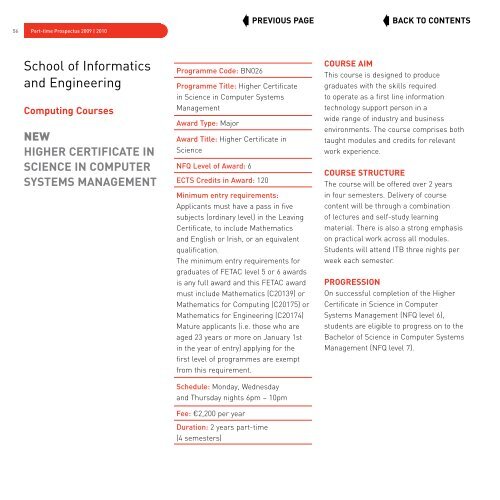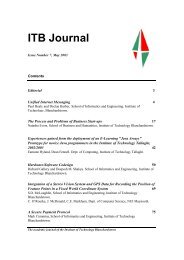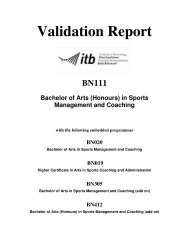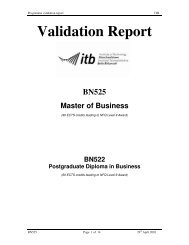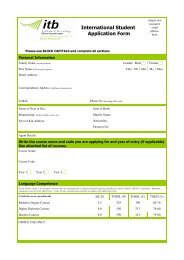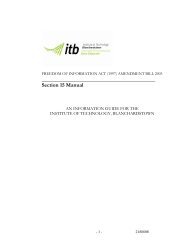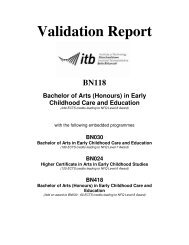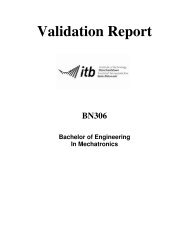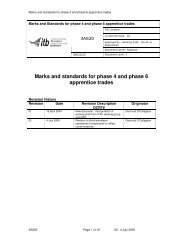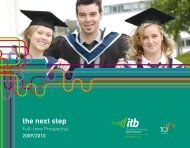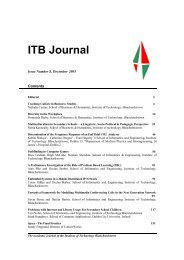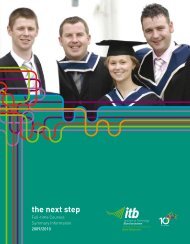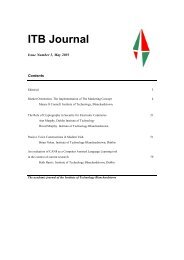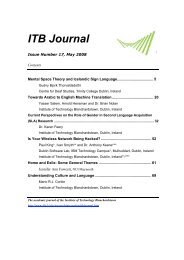new horizons - Institute of Technology Blanchardstown
new horizons - Institute of Technology Blanchardstown
new horizons - Institute of Technology Blanchardstown
You also want an ePaper? Increase the reach of your titles
YUMPU automatically turns print PDFs into web optimized ePapers that Google loves.
Previous Page BAck to Contents Next Page ➧<br />
BAck to Contents<br />
56<br />
Part-time Prospectus 2009 | 2010<br />
Computing Courses<br />
57<br />
School <strong>of</strong> Informatics<br />
and Engineering<br />
Computing Courses<br />
NEW<br />
HIGHER CERTIFICATE IN<br />
SCIENCE IN COMPUTER<br />
SYSTEMS MANAGEMENT<br />
Programme Code: BN026<br />
Programme Title: Higher Certificate<br />
in Science in Computer Systems<br />
Management<br />
Award Type: Major<br />
Award Title: Higher Certificate in<br />
Science<br />
NFQ Level <strong>of</strong> Award: 6<br />
ECTS Credits in Award: 120<br />
Minimum entry requirements:<br />
Applicants must have a pass in five<br />
subjects (ordinary level) in the Leaving<br />
Certificate, to include Mathematics<br />
and English or Irish, or an equivalent<br />
qualification.<br />
The minimum entry requirements for<br />
graduates <strong>of</strong> FETAC level 5 or 6 awards<br />
is any full award and this FETAC award<br />
must include Mathematics (C20139) or<br />
Mathematics for Computing (C20175) or<br />
Mathematics for Engineering (C20174)<br />
Mature applicants (i.e. those who are<br />
aged 23 years or more on January 1st<br />
in the year <strong>of</strong> entry) applying for the<br />
first level <strong>of</strong> programmes are exempt<br />
from this requirement.<br />
COURSE AIM<br />
This course is designed to produce<br />
graduates with the skills required<br />
to operate as a first line information<br />
technology support person in a<br />
wide range <strong>of</strong> industry and business<br />
environments. The course comprises both<br />
taught modules and credits for relevant<br />
work experience.<br />
COURSE STRUCTURE<br />
The course will be <strong>of</strong>fered over 2 years<br />
in four semesters. Delivery <strong>of</strong> course<br />
content will be through a combination<br />
<strong>of</strong> lectures and self-study learning<br />
material. There is also a strong emphasis<br />
on practical work across all modules.<br />
Students will attend ITB three nights per<br />
week each semester.<br />
PROGRESSION<br />
On successful completion <strong>of</strong> the Higher<br />
Certificate in Science in Computer<br />
Systems Management (NFQ level 6),<br />
students are eligible to progress on to the<br />
Bachelor <strong>of</strong> Science in Computer Systems<br />
Management (NFQ level 7).<br />
COURSE CONTENT<br />
Year 1<br />
Computer Systems (M)<br />
Operating Systems 1 (M)<br />
Computer Networks 1 (M)<br />
S<strong>of</strong>tware Development 1 (M)<br />
Interpersonal Communications and PC<br />
Applications (M)<br />
Work Based Learning (M)<br />
Year 2<br />
Computer Networks 2 (E)<br />
Operating Systems 2 (E)<br />
S<strong>of</strong>tware Development 2 (E)<br />
Mathematics (E)<br />
Databases (E)<br />
Training and Support (E)<br />
Hardware and S<strong>of</strong>tware Forensics (E)<br />
Business Management (E)<br />
(M) Mandatory Modules<br />
(E) Elective Modules<br />
All Modules are 10 ECTS Credits.<br />
Computer Networks I and 2<br />
The aim <strong>of</strong> these modules is to give<br />
the student an overview <strong>of</strong> computer<br />
networking technologies and standards.<br />
Networks 2 follows on from Networks 1<br />
to extend the student’s knowledge<br />
<strong>of</strong> computer networking technologies<br />
and standards, and to develop network<br />
design skills.<br />
Operating Systems I and 2<br />
The aim <strong>of</strong> operating systems 1 is to<br />
introduce the student to the basics<br />
<strong>of</strong> operating systems and systems<br />
administration. Operating systems 2<br />
extends the concepts from operating<br />
systems 1 to multi-user and network<br />
based operating systems.<br />
S<strong>of</strong>tware Development I and 2<br />
The aim <strong>of</strong> these modules is to develop<br />
the students’ ability to solve problems<br />
in a structured way using basic<br />
programming techniques. S<strong>of</strong>tware<br />
Development 2 follows from S<strong>of</strong>tware<br />
Development 1, and aims to further<br />
develop programming skills and an<br />
understanding <strong>of</strong> data structures,<br />
algorithms and their applications.<br />
Computer Systems<br />
This module aims to educate the<br />
student in the installation, configuration,<br />
troubleshooting and fault diagnosis/<br />
reporting associated with modern<br />
personal computer motherboard/<br />
peripherals and device driver s<strong>of</strong>tware.<br />
Interpersonal Communications and<br />
PC Applications<br />
This module is designed to emphasise,<br />
reinforce and extend the key practical<br />
skills <strong>of</strong> communication to enable the<br />
student to communicate competently and<br />
successfully in any future pr<strong>of</strong>essional<br />
context. The module will also give the<br />
student a working knowledge <strong>of</strong> <strong>of</strong>fice<br />
management s<strong>of</strong>tware.<br />
Schedule: Monday, Wednesday<br />
and Thursday nights 6pm – 10pm<br />
Fee: €2,200 per year<br />
Duration: 2 years part-time<br />
(4 semesters)


